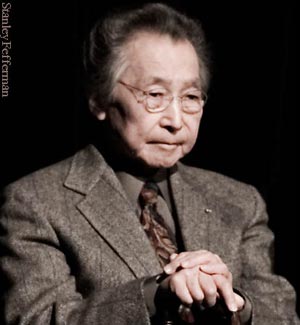| Edgard Varèse, who died in 1965, is currently considered one of the leading composers of the 21st Century.
His legacy is curated by Chou Wen-chung, Varèse’s student since 1949 and subsequently his assistant, amanuensis, editor and collaborator of the later works. A considerable composer in his own right, Chou Wen-chung shared his reminiscences of life with Varèse, his insights into Varèse’s music, and introduced his own compositions during this weekend festival presented by New Music Concerts and its ubiquitous artistic director, Robert Aitken.
|
| Both composers saw the need to change the paradigm of what was considered ‘serious music’ of their time. Varèse, a Frenchman, emigrated to New York in 1915, having burnt all his manuscripts that linked him to the Wagnerian tradition of European Music, and set out in “Ameriques” (for large orchestra) to discover new worlds of sound: “fiercely dissonant chords, rhythmically complex polyphonies for percussion and wind, forms in continuous evolution with no large-scale recurrence.” In 1931, Varèse wrote the first European work to dispense with pitched sounds. Subsequent compositions introduced electronic instruments purely electronic music, produced by means of tape recorder.
Chou Wen-chung, born in China, writes music as "a humble tribute to the universality of the genius of Bach." His composing is based on principles drawn from tradition, Chinese paintings and the Chinese theories of ‘yin/yang’ and ‘I-Ching’. Chou’s works are uniquely free of the grammar of both Western and Oriental musical traditions.
|
|

Chou Wen-chung |
|
| If there were such an organization as ‘Composers without Borders’, both composers would be charter members. If the organization had a manifesto, it would contain phrasing to the effect that the unparalleled development of Western music during the past 500 years is nearly at a standstill and can be revived only by input from other musical cultures. This means looking to World Music, and to Jazz, Rock, Electronic and non-terrestrial cultures, as we hear in the music of Frank Zappa, another admirer of Varèse.
The music, seven pieces by Varèse and three by Chou Wen-Chung, spread over two concerts and performed by ensembles of up to 40 instruments, was spectacular. The compositions ranged in scope from Varèse’s “Density 21.5”, a four minute piece for solo flute performed by Robert Aitken, through “Offrandes” for strings, winds and soprano, to “Ionisation” for more than a dozen non-pitched instruments (percussion, sirens).
The most accessible pieces were Chou Wen-Chung’s “Twilight Colours” (2007), and Varèse’s “Offrandes”, featuring soprano Teri Dunn. The former, a double trio for woodwinds and strings is gentle, melancholy music, spacious, solitary and sad, in a pastoral mood, that captivates with an opening dialogue of foghorn tones from the bass clarinet echoed by cello, that is paralleled by the viola and oboe. The Varèse piece has a jazz/bluesy flavour, is funny and light, with extremely long-held notes of the winds, fanfare of brass, plangent harp runs and floaty transparent soprano vocalizations. It is highly imaginative in the way of Debussy’s “Prélude à l’après-midi d’un faune.”
What most remains in the mind from this ‘festival’ is the energy of total dedication. The first example is that of Robert Aitken who made this homage to Varèse happen. The second is the example of Chou Wen-Chung, who seems to have dedicated major portions of his time and energy as a composer to take care of’ Varèse’s musical legacy, enduring endless legal wrangling and bureaucratic pettiness to ensure that correct editions remain safe, secure, and available for the future. The warm energy, and detail of his expositions of the principles behind his own music and that of his friend create a hunger to know more, and to hear more in this music.
Finally, we have been implanted with the example of Varèse himself, who set out to explore music 100 years beyond the boundaries of his own time, and who endured and overcame an indifference that almost silenced him, in order to fulfill his desire to hear music purely as sound, and to make that experience available to others who are willing to be guided towards spaces beyond convention.
|


